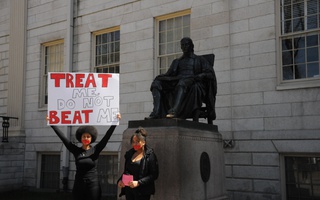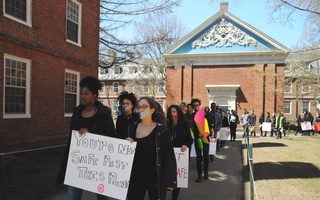{shortcode-7c02efbc05bb69ce7ae3dcdc1c6f091a55a892f2}
Spokespeople for Harvard University Health Services and the Harvard University Police Department said both organizations followed proper protocol before and during the arrest of a black Harvard undergraduate Friday that has sparked allegations of police brutality.
HUHS was contacted about the student, who was naked and likely under the influence of narcotics. But the Cambridge Police Department ultimately arrived on the scene and made the arrest, charging the undergraduate on several counts including assault, indecent exposure, and resisting arrest.
An account of events given by the Harvard Black Law Students Association stated that HUHS transferred the call directly to CPD, drawing questions from some students as to why HUHS immediately contacted an outside police department and causing some to wonder whether officials involved followed proper protocol.
But HUPD spokesperson Stephen G. Catalano wrote in an email Monday that HUHS actually contacted HUPD first. Catalano said HUPD then transferred the call to CPD, which he described as the “department with primary jurisdiction.”
CPD had jurisdiction because the student—who was arrested at the intersection of Massachusetts Ave. and Waterhouse St., feet from Harvard Law School’s campus—was not standing on campus and was thus outside HUPD’s jurisdiction, Catalano wrote. HUPD has to inform other police departments of any incidents that take place outside of Harvard’s campus, according to Catalano.
HUHS spokesperson Michael Perry wrote that HUHS has conducted a review of “what occurred on Friday evening.” He wrote that HUHS called HUPD “per standard protocol” and that “jurisdictional requirements” mandated that HUPD transfer the call to CPD.
“We have confirmed that HUHS’s standard protocol was followed,” he wrote.
Catalano likewise wrote that HUPD followed proper protocol.
“In a case where HUHS calls the HUPD for an incident occurring off campus we would either connect HUHS to the local police department with jurisdiction or HUPD would contact them directly,” Catalano wrote.
Catalano wrote in a separate email Monday that, after HUPD initially notified CPD of the situation, CPD then asked HUPD to come to the scene. But by the time HUPD arrived, CPD had already made the arrest, Catalano wrote.
“We transferred the call. CPD then called us back to come to scene,” Catalano wrote. “Upon arrival the student was under arrest.”
CPD officers arrested the student Friday night after a physical encounter. Officers tackled the student to the ground.
Officers from CPD later wrote in a police report that they tackled the student because he was making aggressive movements toward law enforcement. But members of BLSA who witnessed the event have stated CPD’s version of events is “incorrect,” stating that officers tackled the student “without provocation.”
While the student was on the ground, at least one CPD officer punched the undergraduate in the stomach five times in an attempt to unpin the student’s arms and handcuff the undergraduate, according to the CPD police report. Some University affiliates have called the arrest an instance of police brutality; students, faculty, and staff held gatherings in the days after the incident to respond, reflect, and organize.
Perry wrote in an email that HUHS and HUPD have “long established relationships and protocols” that outline “the role each unit plays in all situations involving the Harvard community.”
“HUHS’s standard protocol is to contact HUPD for any emergency concern related to a Harvard student. In instances when an incident occurs off campus, HUPD is required to involve the police department with jurisdiction over the location,” he wrote. “In cases where a life-threatening emergency is possible, HUHS will recommend the caller contact 911 immediately.”
“Any call to 911 will trigger a response by Professional Ambulance and the police department with jurisdiction,” he added.
CPD is conducting an internal review in the wake of the arrest given the incident involved a use of force. CPD policy mandates the department must conduct this kind of review any time force is used.
—Staff writer Caroline S. Engelmayer can be reached at caroline.engelmayer@thecrimson.com. Follow her on Twitter @cengelmayer13.
—Staff writer Michael E. Xie can be reached at michael.xie@thecrimson.com. Follow him on Twitter @MichaelEXie1.Recommended Articles
-
 Freshmen, Proctors Say They Feel Uncertain for Future After Arrest
Freshmen, Proctors Say They Feel Uncertain for Future After Arrest -
Similar 2006 Arrest of Non-Black Student Saw 'No Punches'Last Friday’s arrest of a black Harvard undergraduate does not mark the first time local authorities physically confronted and arrested a naked College student under the influence of drugs.
-
 'Treat Me, Don't Beat Me'
'Treat Me, Don't Beat Me' -
An Explanation After the ArrestWe hope that the administration clarifies its procedure for involving police in situations where students and affiliates require medical attention.
-
 Hundreds of Harvard Affiliates Sign Letter Demanding Reform After Black Student's Arrest
Hundreds of Harvard Affiliates Sign Letter Demanding Reform After Black Student's Arrest













